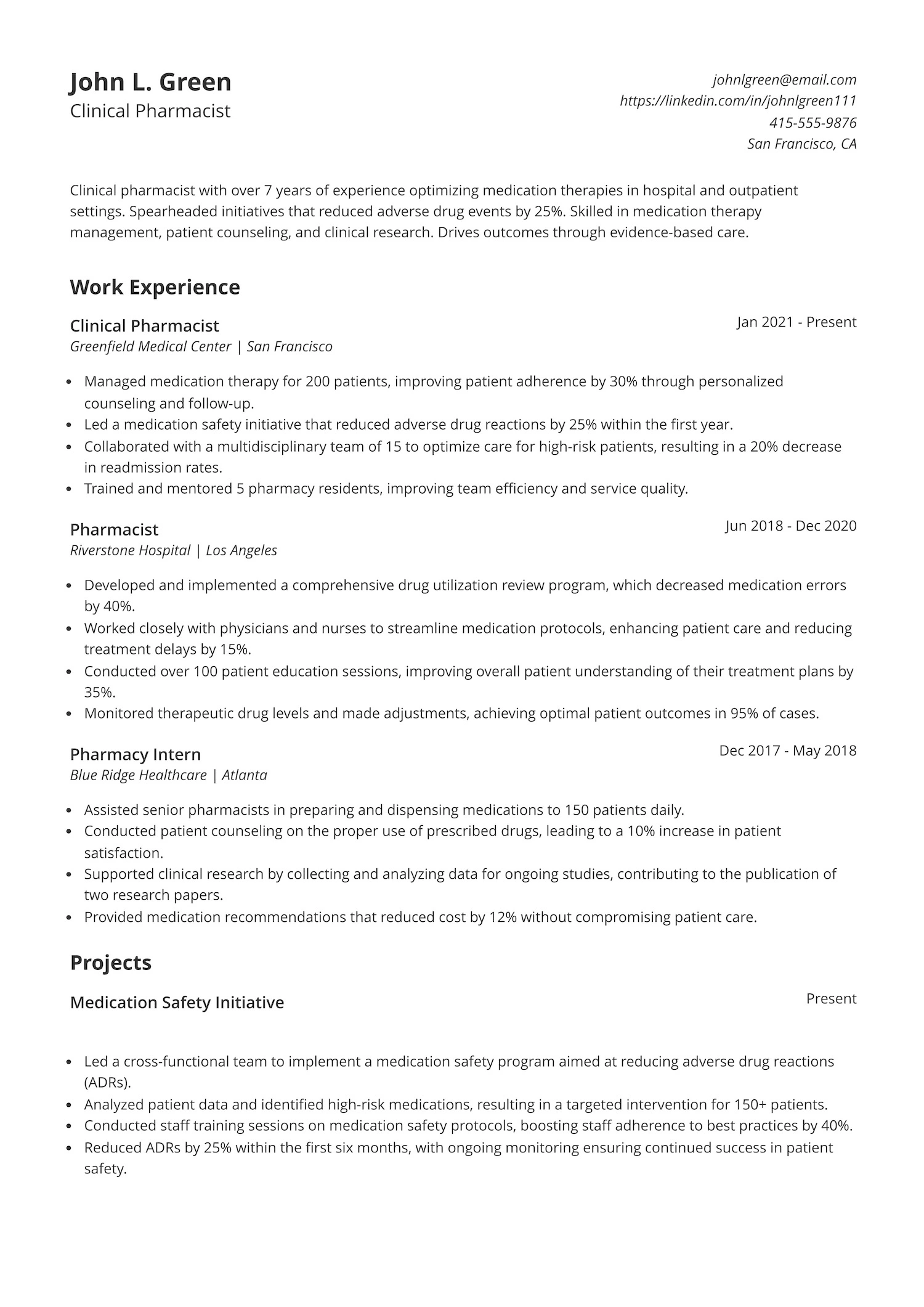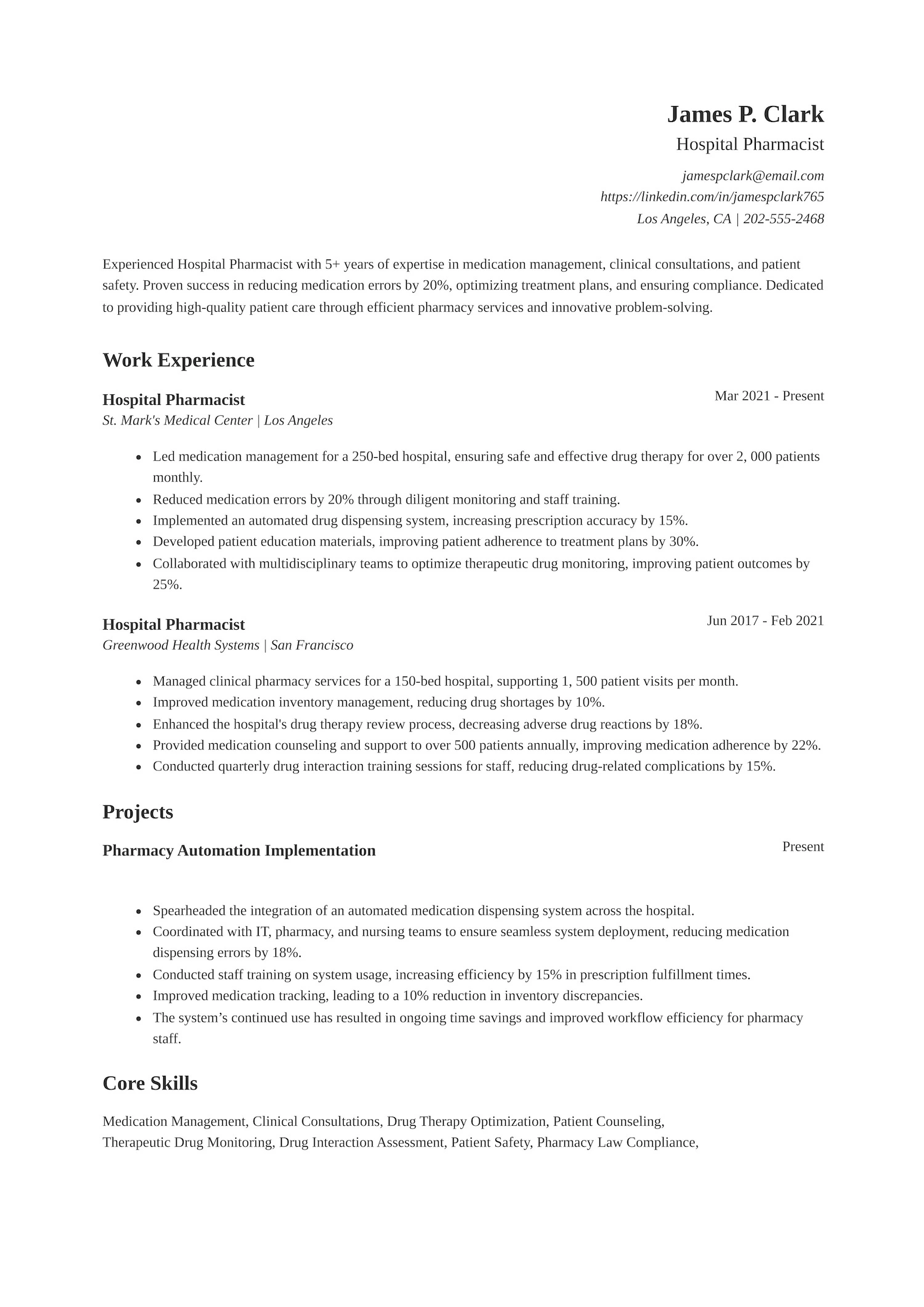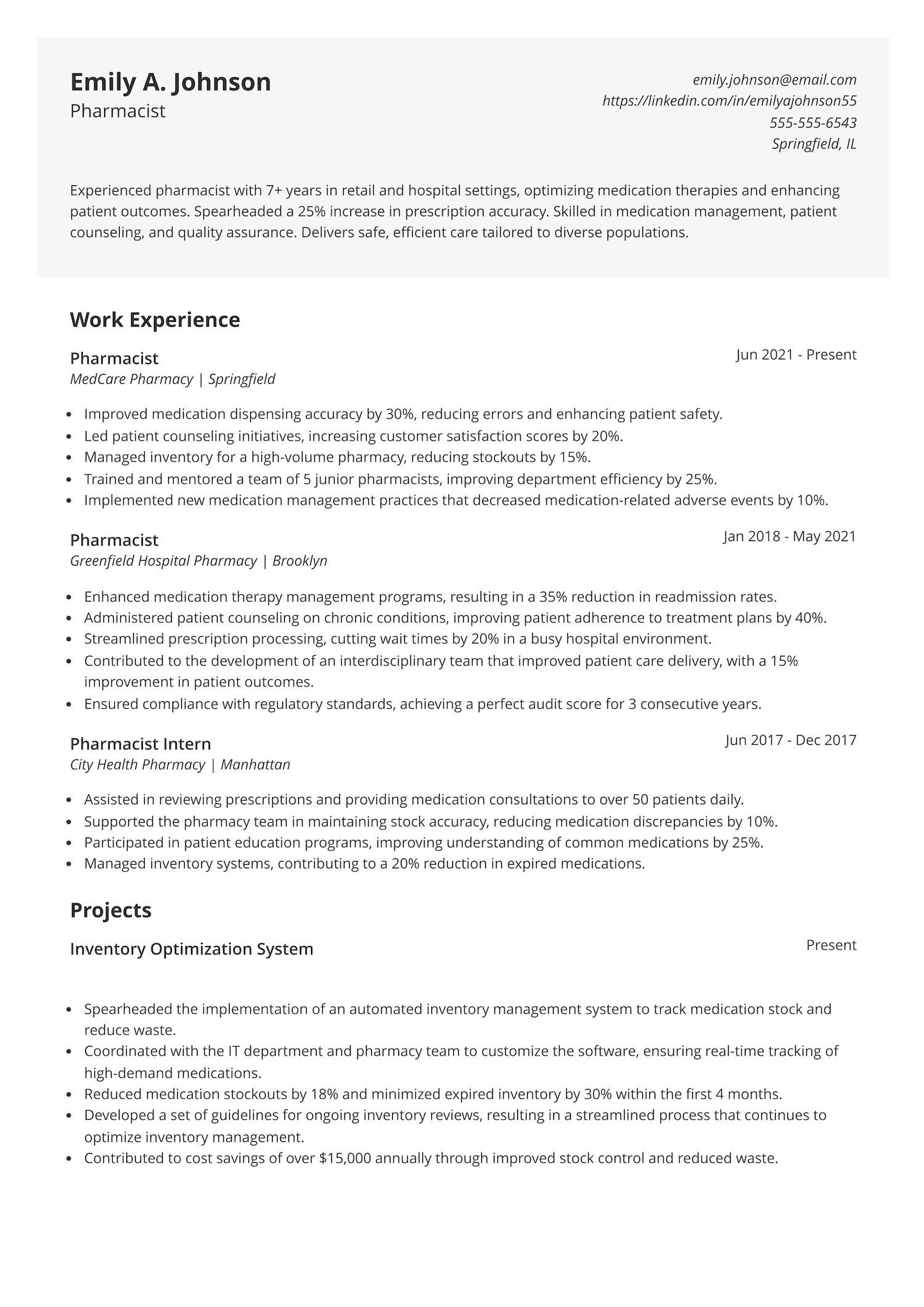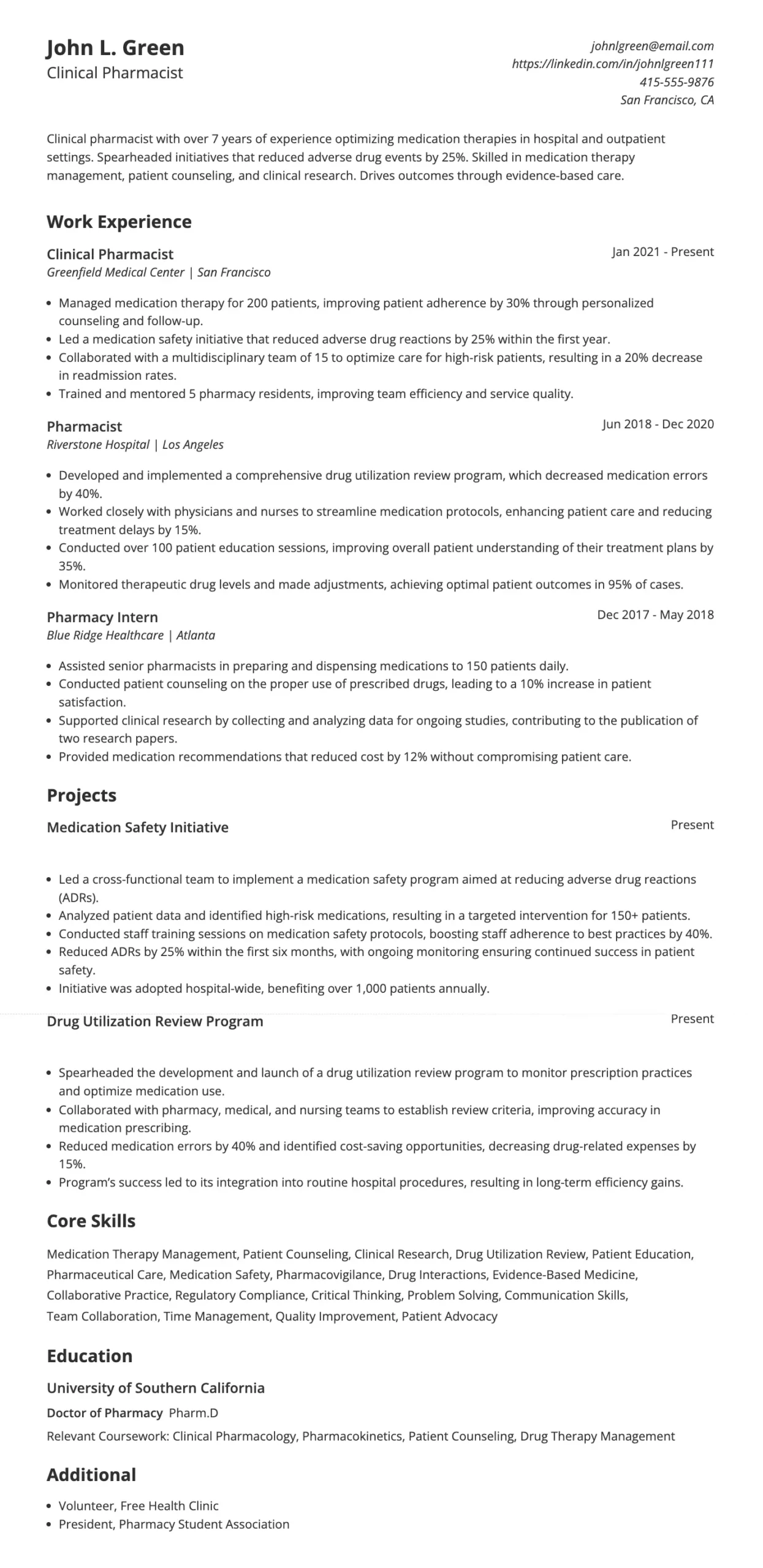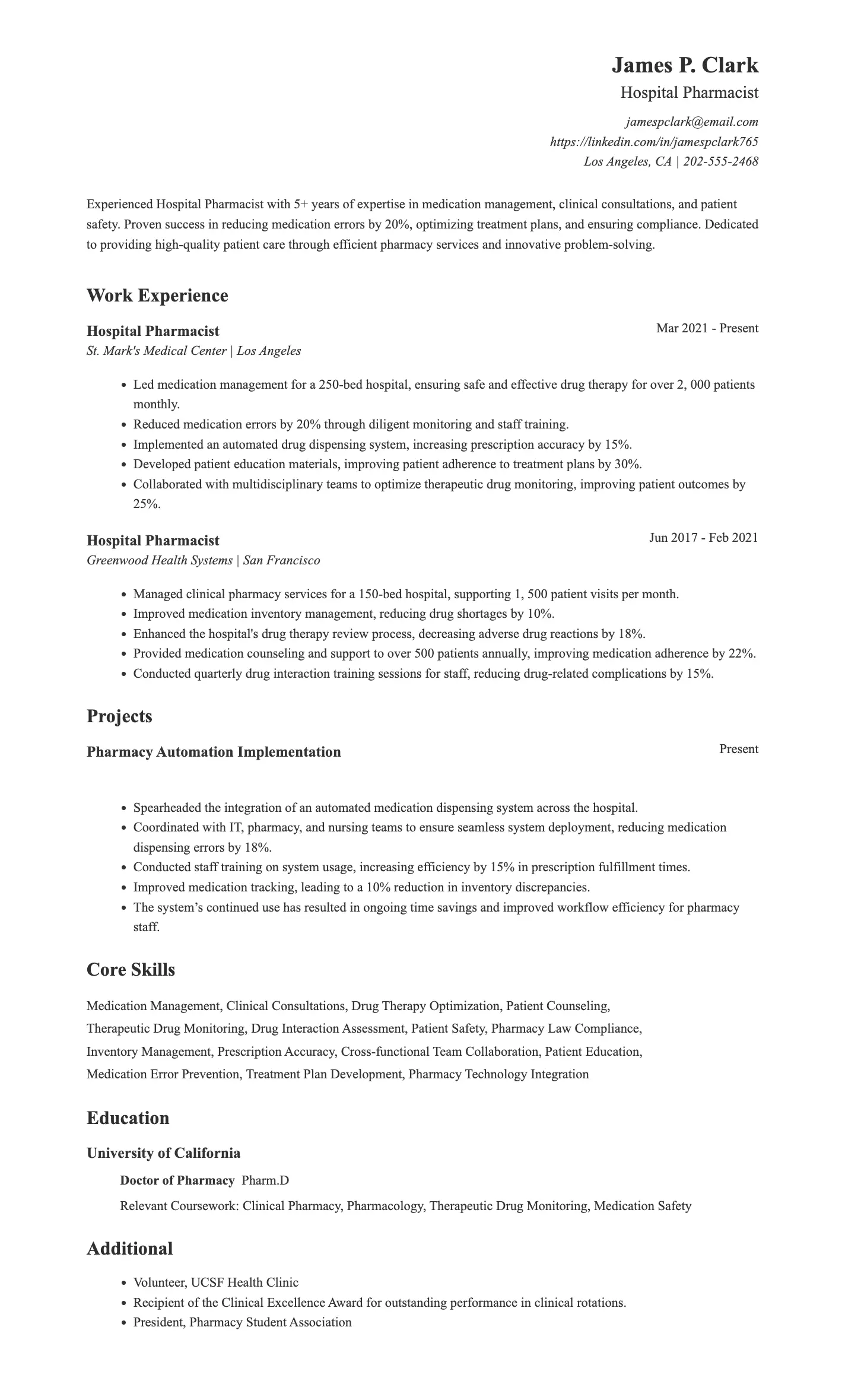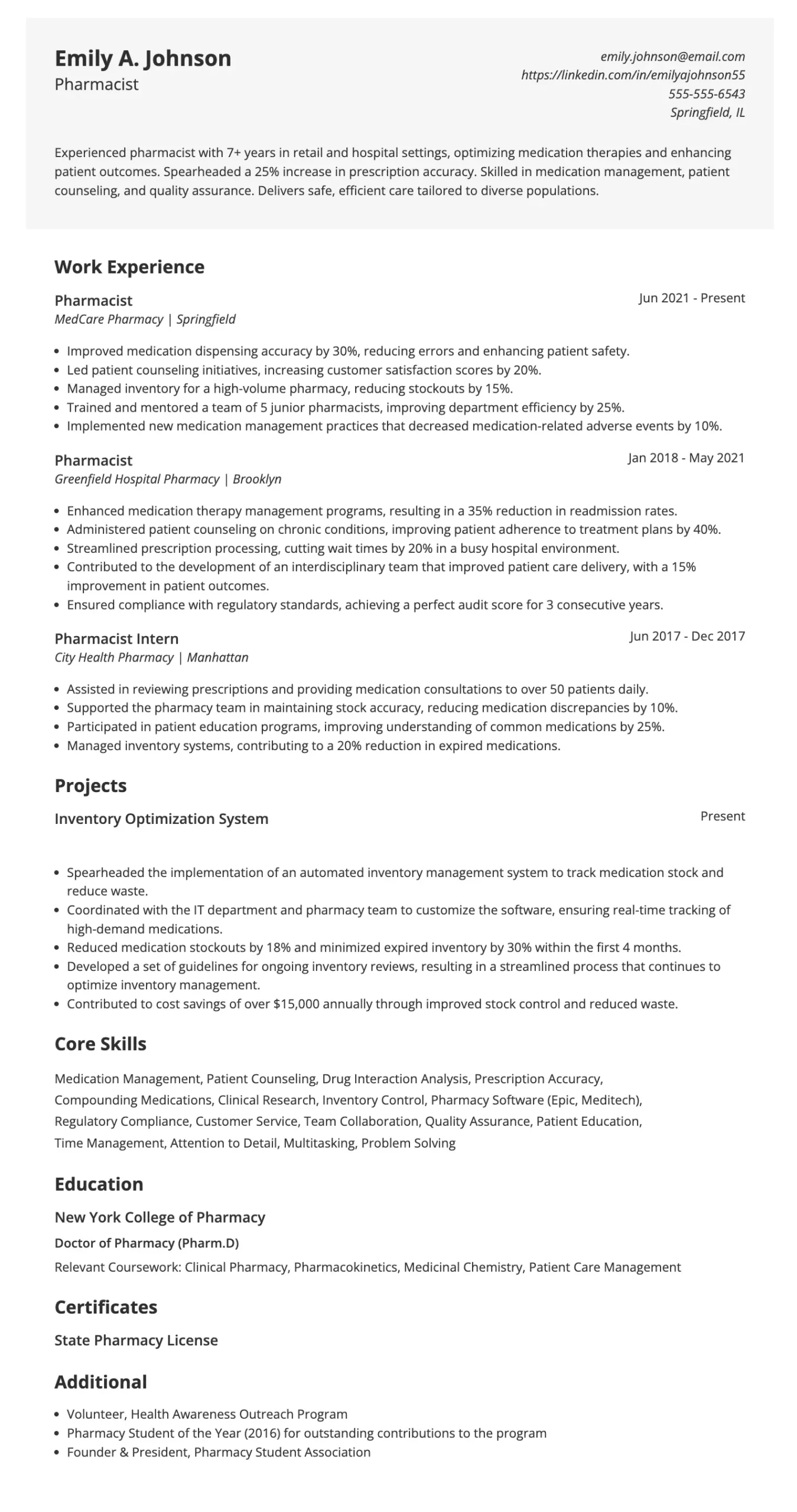Best Pharmaceutical Resume Examples & Tips for 2025
Ready to create a pharmaceutical resume that stands out? In this guide, explore pharmaceutical resume examples and expert tips to create a resume that gets you hired in 2025!

July 29, 2025

Pharmaceutical professionals play a critical role in advancing healthcare through research, development, and patient safety. Whether you’re applying for a role as a hospital pharmacist, pharmacy manager, or pharmacy technician, this guide will give you with expert-written resume examples and proven tips to help you create a standout pharmaceutical resume.
Employers seek candidates with a blend of technical expertise, compliance knowledge, and a results-driven mindset. A strong, well-structured resume is essential to make a lasting impression and land interviews in this competitive field.
Ready to build a resume that shows you’re exactly what pharmaceutical employers are looking for? Keep reading—we’ll break it down step by step and give you the tools to make your resume shine.
Clinical pharmacist resume example
Are you ready to take your career as a clinical pharmacist to the next level? Do you want to make a tangible difference in patient care while working in dynamic healthcare environments? The resume below highlights the skills and experience you need to thrive in a clinical pharmacist role.
In this role, you’ll be expected to manage medication therapies, improve patient adherence, and collaborate with healthcare teams to ensure optimal patient outcomes. The job requires strong communication skills, the ability to implement safety protocols, and a commitment to evidence-based care. You’ll also need to demonstrate leadership in reducing medication errors and improving patient education.
This resume template stands out because it highlights measurable achievements, like reducing adverse drug events by 25% and improving patient adherence by 30%. It demonstrates a strong focus on patient care and safety, with specific initiatives like medication safety programs and drug utilization reviews. Employers will appreciate the clear, results-driven approach, the ability to work in multidisciplinary teams, and the leadership shown in improving efficiency and patient outcomes. It’s a well-rounded profile that shows both skills and impact.
Hospital pharmacist resume example
Looking to stand out as a hospital pharmacist? Wondering how to showcase your experience in medication safety, clinical care, and pharmacy operations? This resume example highlights exactly how to position your skills, results, and impact in a way that grabs attention and proves value.
Hospital pharmacists are expected to manage medications with precision, collaborate across teams, and ensure patient safety every step of the way. Employers look for professionals who can improve workflows, reduce errors, and support treatment plans through hands-on care and smart pharmacy practices.
The work experience section uses strong action verbs like “Led,” “Implemented,” and “Developed” to show initiative. It backs up achievements with real metrics, like reducing medication errors by 20% and improving patient adherence by 30%, making the impact clear. Employers love seeing results tied to actions. It also highlights collaboration and innovation, both key in hospital pharmacy roles.
Pharmacist resume example
Want to step into a pharmacist role that values precision, patient care, and leadership? Not sure how to showcase years of experience in both hospital and retail settings? This pharmacist resume example can help you stand out by showing exactly what hiring managers want to see.
Pharmaceutical jobs call for more than just filling prescriptions. Employers are looking for candidates who can manage inventory, counsel patients, ensure regulatory compliance, and improve clinical outcomes. Your resume should reflect a strong balance of technical skills and people skills, while proving you can deliver results under pressure.
The core skills section blends hard skills like Drug Interaction Analysis and Pharmacy Software with soft skills like Team Collaboration and Attention to Detail. It gives a full picture of what the candidate brings to the table with relevant work experience and a dedicated projects section. The clean, ATS-friendly layout makes it easy for employers to find key info quickly. Strong education and measurable achievements back it all up, making this resume both appealing and effective.
Pharmacy manager resume example
Thinking about a pharmacy manager role but not sure how to stand out? Wondering how to highlight your leadership, operational skills, and patient-focused results on a resume? This example shows exactly how to get it right—with clear metrics, strong achievements, and a clean format that speaks to hiring managers.
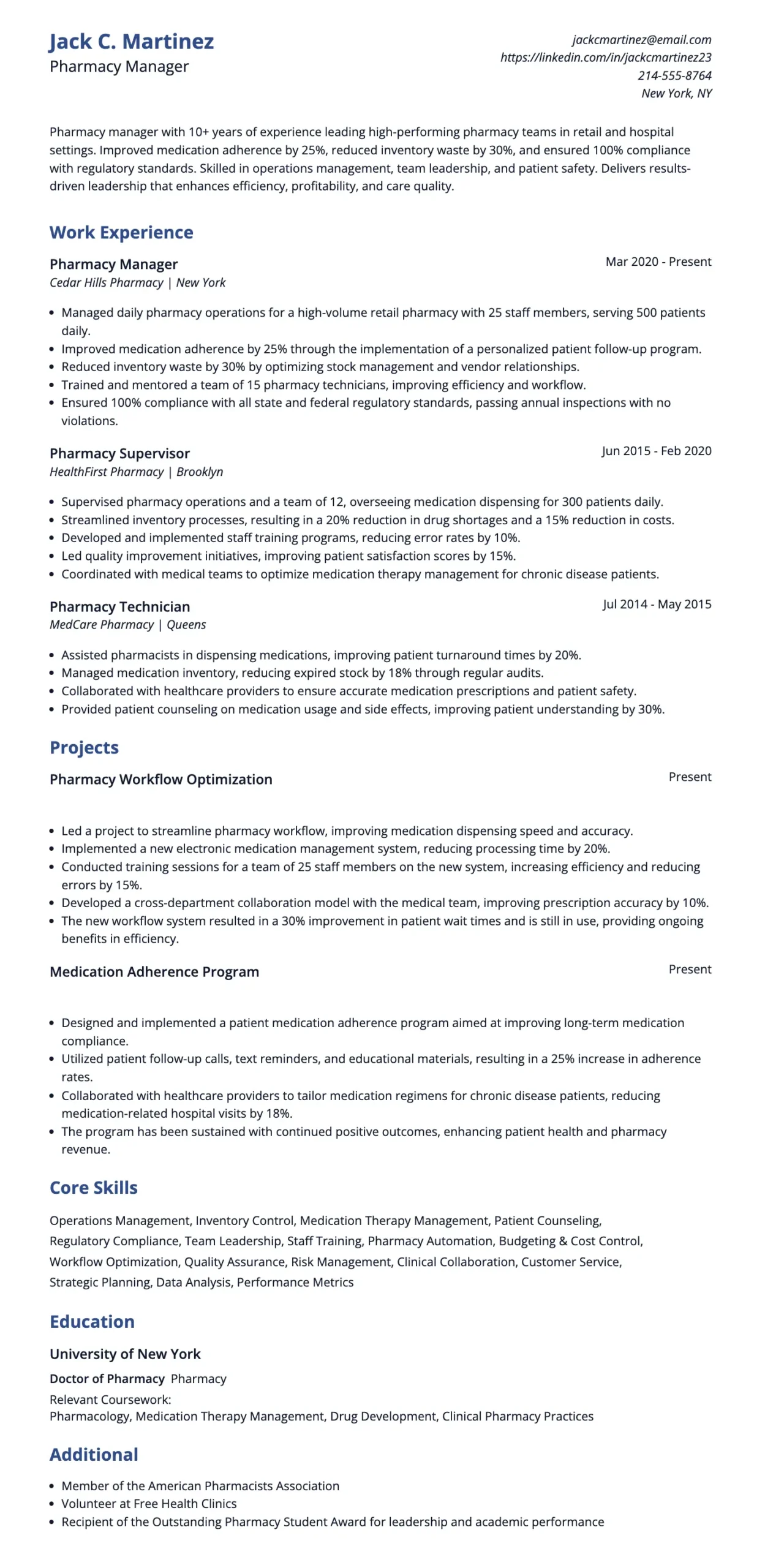
Pharmacy manager roles call for a mix of clinical knowledge, operational expertise, and team leadership. Employers are looking for someone who can manage staff, optimize workflows, and ensure compliance—all while keeping patient care front and center. A solid resume should show impact, not just tasks.
This resume format works because it shows the impact, not just experience—something employers value in senior roles. The dedicated Projects section stands out, with clear wins like Pharmacy Workflow Optimization and Medication Adherence Program that highlight leadership and long-term value. It also uses a clean, ATS-friendly layout that’s easy to read, helping key achievements get noticed quickly.
Pharmacy technician resume example
Trying to break into the pharmacy field or take the next step in your technician career? Not sure how to highlight the right experience and skills on your resume? This pharmacy technician resume example shows exactly how to get it done with clear achievements and a strong skill set.
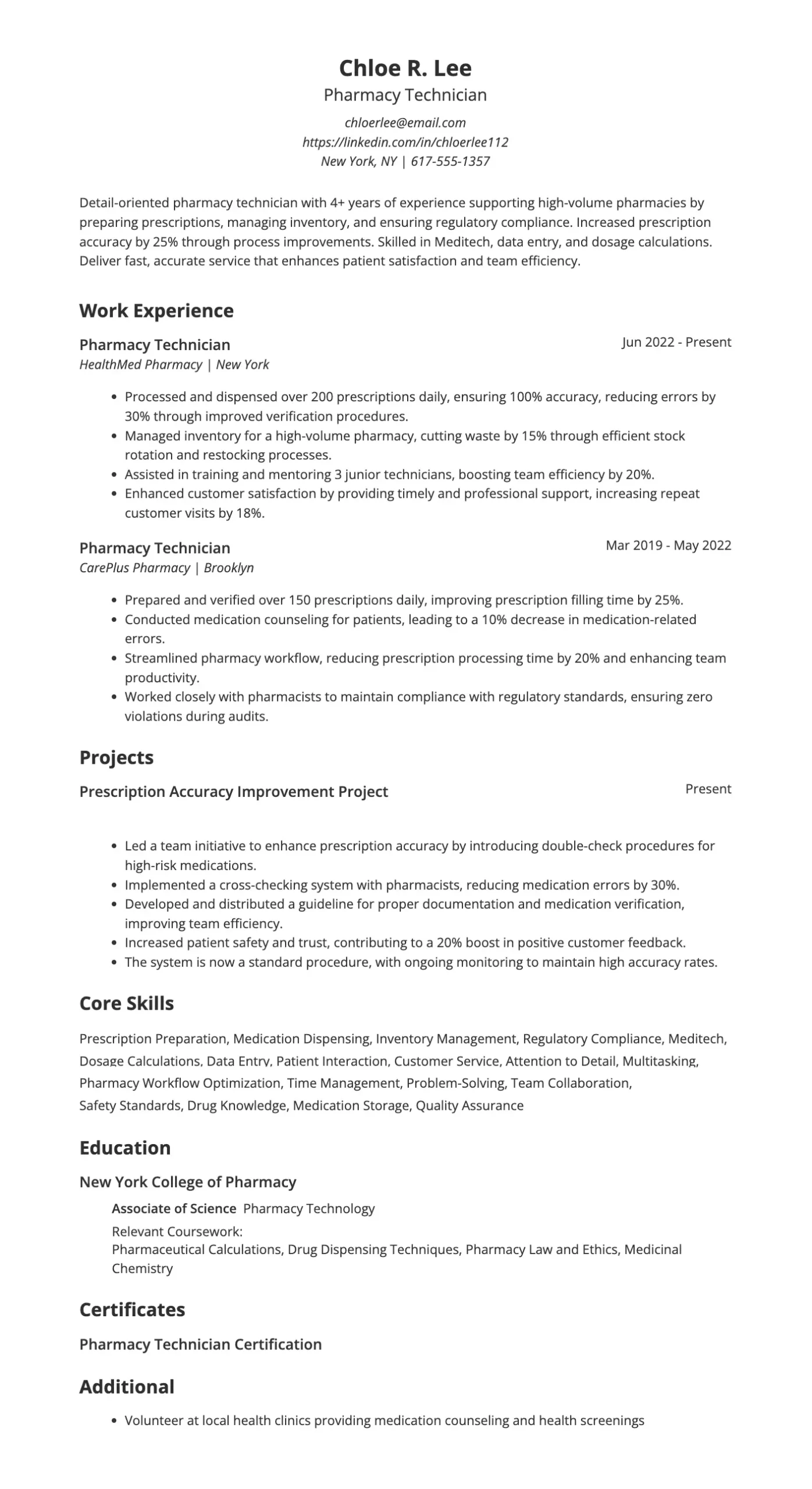
Pharmacy technician roles call for precision, multitasking, and a solid understanding of medications and compliance. Employers want candidates who can manage prescriptions, support pharmacists, and keep things running smoothly in a fast-paced setting. If you’re aiming for this role, your resume should prove you’re reliable, efficient, and ready to make a difference.
This resume shows real impact—like cutting errors and boosting efficiency. It backs up skills with numbers, proving value right away. The layout is clean, and the core skills are easy to scan. Projects and achievements are clearly tied to patient care and safety, which matters most in this role. Employers see someone who knows the job, delivers results, and fits into a fast-paced pharmacy setting.
Also Read: 10 Best Resume Skills to Put on a Resume
How to write a pharmaceutical resume that will get you an interview
When applying for a job in the pharmaceutical industry, your resume needs to stand out and effectively highlight your skills, experience, and achievements. A well-written resume is essential to catching the eye of hiring managers and landing that crucial interview.
Many pharmaceutical companies use Applicant Tracking Systems (ATS) to streamline the hiring process. An ATS works like a search engine, scanning resumes for specific keywords and formatting to determine whether a candidate should move forward in the hiring process. To increase your chances of being seen by a hiring manager, it’s important to tailor your resume with the right terminology.
For pharmaceutical roles, commonly searched terms include clinical research, regulatory compliance, GCP, pharmacovigilance, and FDA guidelines. Including these keywords, when they genuinely reflect your experience, can help your resume attract the hiring team’s attention.
How ATS works:
- Job posting setup: Employers define the required qualifications, skills, and experience in the job description.
- Resume scanning: The ATS scans each resume for relevant keywords and extracts core details.
- Searchable database: Recruiters search resumes using terms that match the job’s criteria, finding the candidates who best suit the role.
Want to boost your chances of impressing recruiters? Use tools like Jobscan’s resume builder to create an ATS-friendly resume that meets current pharmaceutical industry standards—for free!
Optimize your resume
Use Jobscan's resume scanner to ensure your pharmaceutical resume is ATS-friendly and includes all the necessary keywords from the job description.
Scan your resume
Key elements of a pharmaceutical resume
To create a compelling pharmaceutical resume, make sure to include these essential components:
- Contact Information: Full name, phone number, professional email, and LinkedIn profile.
- Professional Summary: A concise overview of your work history, skills, and career goals.
- Skills Section: Highlight technical and soft skills relevant to the pharmaceutical industry.
- Work Experience: Use bullet points to describe your key achievements and responsibilities in your work experience section.
- Projects: Showcase relevant pharmaceutical or research projects, especially those involving drug development, clinical trials, or regulatory work.
- Education: Include degrees, certifications, and relevant coursework.
- Certifications and Licenses: Mention any professional certifications such as RPh, PharmD, or PMP.
Write a strong professional summary
Your resume summary is the first thing recruiters see—it should capture your strengths and align with the role you’re applying for. Tailor it for each job to emphasize how your experience fits the employer’s needs.
Let’s look at some examples of both good and bad professional summaries.
Good examples of a resume summary
- “Licensed Pharmacist with over 7 years of experience in clinical and retail settings. Proven ability to manage high-volume workflows while maintaining patient safety.”
- “Detail-oriented Regulatory Affairs Specialist with expertise in FDA submissions and compliance documentation. Strong background in pharmaceutical labeling and drug approval processes.”
- “Results-driven Clinical Research Associate with 5+ years managing Phase II–IV trials across multiple therapeutic areas. Skilled in patient enrollment and protocol adherence.”
Bad examples of a resume summary
- “Hardworking person looking for a job in the pharmaceutical industry.”
- “I have done many tasks and worked in different areas.”
- “Seeking a challenging role where I can use my skills and grow in my career.”
Need help writing a strong professional summary for your pharmaceutical resume? Let Jobscan’s Summary Generator assist you in creating a compelling, ATS-optimized summary tailored to the pharmaceutical industry. The summary should highlight your skills, achievements, and qualifications to catch the attention of recruiters.
Demonstrate key pharmaceutical skills
In the pharmaceutical industry, demonstrating both hard and soft skills on your resume is essential for showcasing your qualifications. Employers are looking for candidates who have the technical expertise needed to succeed, as well as the interpersonal abilities to thrive in a collaborative, fast-paced environment.
Hard skills for a pharmaceutical professional
- Clinical Research
- Regulatory Affairs
- Pharmacovigilance
- Pharmaceutical Manufacturing
- Lab Techniques
- Data Analysis
- FDA Regulations
- Drug Development
Soft skills for a pharmaceutical professional
- Communication
- Problem-Solving
- Attention to Detail
- Teamwork
- Time Management
- Adaptability
- Critical Thinking
Incorporating these skills into your bullet points can effectively highlight your achievements and demonstrate your expertise in the pharmaceutical field. However, there’s a right and wrong way to present your skills. Let’s look at examples that show how to effectively showcase your abilities in your resume.
Write impactful resume bullet points for a dental assistant
Resume bullet points are the core of your experience section. They should clearly communicate your skills, the impact you’ve made, and the value you bring to a team. Instead of listing tasks, focus on what you accomplished using specific tools, action verbs, and measurable results. Here’s what that looks like:
Good examples of resume bullet points
- “Led a cross-functional team in the development of a new pharmaceutical product, ensuring adherence to all regulatory guidelines.”
- “Managed patient enrollment for a Phase III clinical trial, resulting in 100% compliance with study timelines.”
- “Analyzed and interpreted clinical data, contributing to the successful submission of a new drug application to the FDA.”
- “Collaborated with regulatory affairs to prepare and submit documents for IND approval.”
- “Trained and mentored junior staff on laboratory procedures and regulatory compliance protocols.”
Bad examples of resume bullet points
- “Worked in a team on pharmaceutical projects.”
- “Helped with clinical trials.”
- “Did some research and learned a lot about drug development.”
- “Communicated with team members on pharmaceutical matters.”
- “Assisted in regulatory paperwork.”
Leverage Jobscan’s Bullet Point Generator to create powerful, results-oriented bullet points for your pharmaceutical resume. Upload your resume and the job description to your Jobscan dashboard, and the tool will generate tailored phrase suggestions that effectively showcase your skills, achievements, and experience in the pharmaceutical industry.
Highlight your achievements as a pharmaceutical professional
When creating your pharmaceutical resume, focus on achievements that highlight your impact, not just responsibilities. Emphasize quantifiable results like improved patient care, cost savings, or successful drug approvals. Use numbers and metrics where possible, and tailor your achievements to the job you’re applying for. This will help set you apart and show employers the value you can bring to their team.
Here are some examples of how to highlight your achievements effectively:
- “Reduced patient enrollment time for clinical trials by 20%, accelerating project timelines and improving cost efficiency.”
- “Played a key role in the successful launch of a new drug, leading to a 30% increase in sales within the first quarter.”
- “Developed and implemented a new inventory management system that reduced pharmaceutical waste by 15%.”
- “Successfully managed a team of 10 to complete a high-stakes regulatory submission, meeting all deadlines and ensuring compliance with FDA standards.”
Tailor your resume to the job description
Customizing your pharmaceutical resume for each job application is crucial to making it stand out. By aligning it with the job description, you can highlight the skills and achievements most relevant to the role.
Here’s how to tailor your resume effectively:
- Analyze the job description: Carefully review the posting to understand the required skills, responsibilities, and qualifications.
- Use the right keywords: Incorporate relevant terms to make your resume ATS-friendly.
- Highlight matching experience: Focus on professional experience that directly aligns with the role’s requirements.
- Adjust bullet points: Modify your bullet points to emphasize the skills and accomplishments that are most relevant to the position.
- Emphasize relevant achievements: Showcase key achievements that demonstrate the skills and results the employer is seeking.
- Adjust your professional summary: Tailor your summary section to showcase your qualifications in line with the specific job’s needs.
Also Read: The Top 5 ATS Resume Keywords of 2025
Include relevant education and certifications
In the pharmaceutical industry, education and certifications play a key role in showcasing your expertise and commitment to the field. Ensure your resume highlights your most relevant educational qualifications, as well as any certifications that set you apart as a qualified professional.
Top pharmaceutical certifications
- PharmD (Doctor of Pharmacy)
- Board Certification in Pharmacotherapy (BCPS)
- Certified Clinical Research Coordinator (CCRC)
- Certified Clinical Research Associate (CCRA)
- Certified Professional in Healthcare Quality (CPHQ)
- Regulatory Affairs Certification (RAC)
- Good Clinical Practice (GCP)
Pharmaceutical resume tips
Creating a standout pharmaceutical resume involves more than just listing your previous roles. You need to showcase your technical expertise, attention to detail, and the measurable impact you’ve made in your field. Here are some tips to help you build a more compelling and effective resume:
- Focus on results: Highlight the outcomes of your work, such as successful drug approvals, efficient clinical trials, or cost-saving initiatives.
- Tailor each resume: Customize your resume for each job by using relevant keywords from the job description and emphasizing the experience that aligns with the role.
- Showcase relevant projects: Include examples of projects you’ve led or contributed to, demonstrating specific skills and impact in pharmaceutical research, clinical trials, or drug development.
- Use strong action verbs: Start bullet points with impactful action verbs like “Led,” “Developed,” “Managed,” or “Optimized” to emphasize your achievements.
- Keep it concise: Stick to one page if possible, especially early in your career. Focus on your most relevant experience and achievements.
- Use clear formatting: Ensure your resume is easy to read with simple headings, consistent fonts, and bullet points that break up information.
- Highlight both hard and soft skills: Showcase your technical abilities, such as clinical research or regulatory knowledge, as well as essential soft skills like teamwork, communication, and problem-solving.
- Include certifications: List any relevant certifications, such as Good Clinical Practice (GCP) or Regulatory Affairs Certification (RAC), to add credibility to your expertise.
- Proofread carefully: A pharmaceutical resume must be free from errors. Make sure your resume is polished and error-free to make a strong impression.
Also Read: How to Organize Your Resume Sections to Stand Out?
Include a cover letter with your pharmaceutical resume
Including a cover letter with your pharmaceutical resume can make a strong first impression. It allows you to express your enthusiasm for the field, highlight relevant experience, and explain why you’re the ideal fit for the role. A well-written cover letter can set you apart from candidates who submit only a resume.
What to include in your cover letter:
- Personalize it: Address the letter to the hiring manager whenever possible, rather than using a generic greeting.
- Start with a strong opening: Briefly mention your pharmaceutical background and what excites you about the opportunity.
- Highlight relevant skills and achievements: Focus on key skills or accomplishments that directly match the job description.
- Showcase your passion for the field: Let your interest in pharmaceutical innovation, patient care, or regulatory excellence come through.
- Keep it concise: Limit your cover letter to one page and maintain a professional, engaging tone.
- End with a call to action: Express your interest in discussing the role further and thank the reader for their time and consideration.
Taking the time to write a tailored, thoughtful cover letter shows initiative, and it can significantly increase your chances of landing an interview. Use Jobscan’s cover letter generator to write a compelling, ATS-optimized cover letter that perfectly complements your pharmaceutical resume and captures the hiring manager’s attention.
Stand out to recruiters with a tailored pharmaceutical resume
Writing a strong pharmaceutical resume takes more than listing your experience—it’s about showcasing the right skills, achievements, and passion for the field in a clear, targeted way. By tailoring your resume to each job, highlighting key accomplishments, and using the right tools, you can stand out to hiring managers and land more interviews.
Struggling to get started? Jobscan’s free Resume Builder makes it easy to create a polished, ATS-friendly pharmaceutical resume. In just a few steps, you can build a professional resume that aligns with industry standards—helping you stand out to recruiters and increase your chances of landing interviews.

Pharmaceutical common interview questions
Can you describe your experience with clinical trials?
Answer:
“In my previous role, I managed multiple clinical trials from Phase I to Phase III, overseeing patient enrollment, data collection, and ensuring compliance with GCP guidelines. I was responsible for maintaining study documentation and working closely with cross-functional teams to ensure timely and accurate reporting. My attention to detail and proactive communication helped the team meet project milestones ahead of schedule.”
How do you stay current with industry regulations and compliance standards?
Answer:
“I stay updated by regularly attending industry webinars, reading journals like the Journal of Pharmaceutical Sciences, and participating in certification programs like Regulatory Affairs Certification (RAC). I also engage with professional networks to discuss changes in FDA regulations and global compliance standards, ensuring I am well-informed and able to apply the latest practices in my work.”
Can you give an example of a challenge you faced in a pharmaceutical project and how you overcame it?
Answer:
“During a Phase II clinical trial, we encountered delays in patient recruitment, which threatened to push back our timelines. To address this, I worked closely with the recruitment team to refine our patient outreach strategy, focusing on local partnerships with healthcare providers. We were able to increase enrollment by 25% in just two months, keeping the project on track and within budget.”
Why do you want to work with our company?
Answer:
“I’ve followed your company’s impressive track record in advancing cutting-edge treatments, especially in oncology and rare diseases. I’m drawn to your commitment to innovation and patient care, and I’m excited about the opportunity to contribute to your work, particularly in clinical trials and regulatory affairs. I believe my experience and passion align well with your mission, and I’m eager to be part of a team that is making a meaningful difference in healthcare.”
Pharmaceutical resume frequently asked questions
What are the most important pharmaceutical skills to highlight on a resume?
Focus on both hard and soft skills that are essential in the pharmaceutical field. Some key hard skills include clinical research, regulatory compliance, data analysis, quality assurance, and pharmacovigilance. Important soft skills include communication, teamwork, attention to detail, and problem-solving. Tailor your skill list to the job description to highlight what’s most relevant.
How do I include my education experience in a pharmaceutical resume?
List your highest degree first, followed by relevant certifications. Include the degree name, institution, and graduation year (or expected graduation date if still in progress). If you have limited work experience, you can also include relevant coursework, research projects, or academic honors that relate to the role.
How should I write a resume if I have no experience as a pharmaceutical professional?
If you’re new to the pharmaceutical field or do not have extensive experience, focus on transferable skills from other industries, such as research, data entry, successful project management, or project coordination. Highlight relevant education, certifications (like GCP or RAC), internships, volunteer experience, or academic projects. Use your professional summary to express enthusiasm for the industry and show how your background prepares you for the role.
